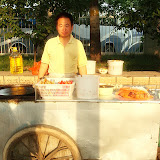There is a huge lag in the transition from college to landing a job in the field of studies that a student graduates from. China’s economy has been progressing so fast in such a short period of time that there are just not enough job position openings for college graduates. It is estimated to be over “4.95 million graduates this spring, up 820,000 from last year”. This staggering number will only grow as each June passes by. In addition to this problem, through my research and interviews with various students, there are also many other factors leading to such a high unemployment rate post- graduation. Many students don’t feel prepared as they progress through college and into graduate schools. 7 out of 7 students that I interviewed felt that the teachers are not competent in the courses they teach, as one said “the professors were not good,.. they are nice, but not very informative”. This has lead to many students not taking classes very seriously, “I don’t even think some students learn from college, I have skipped classes 7 days in a row and nothing happens”. In return, graduates are not prepared for the reality of the real world. They simply do not have the necessary skills to get what is needed, done in the jobs that they will be applying for.
Though my collective data through my interviews are not sufficient to make any solid conclusion, it has help solidified the rest of my research in the fact that an educational degree in China’s current economical situation does not guarantee a job. There are just too many people graduating each year that the workforce can’t keep up. To add to that problem, as I have learned talking to various students and confirmed through my readings, China’s educational system have somewhat failed the students. With good intentions to supply more skilled graduates to the workforce to keep up pace with China’s growing economy, the university had expanded their yearly enrollments. But China has not been able to provide these greater number of students with enough knowledgeable professors who themselves are up to date with the vastly changing economy. Therefore at the end of each school, instead of creating 5 million new skilled workers, China has just thrown 5 million more people, or at least added half of 5 million people into China’s unemployment statistic. Though it looks dark and gloomy at the moment, on the bright side, the government is acknowledging some of these problems. The government has recognize that more qualified college professors are a necessity to China’s future and has invested billions in these programs to help those that want to become the new mentors of China’s future leaders and decision makers. Though the government has yet to fully accept student’s voices of opinion and freedom of speech, they seem to be willing to listen to corporate companies, for they are the center of China’s growing economy. The employers are asking for more quality graduates, and with intentions to provide, the government has also invested money to provide through vocational schooling, these types of workers that employers are asking for. So though the present looks gloomy, if China is willing to listen, learn to improvise, and make changes; the future will surely be brighter.
(Full link to paper http://chinasjobglagpostgraduation.blogspot.com or click right below on my name Nou Chee and click on my China's Job Lag Post-Graduation blog) Enjoy.










